You are using an out of date browser. It may not display this or other websites correctly.
You should upgrade or use an alternative browser.
You should upgrade or use an alternative browser.
Candled Natural Pearls
- Thread starter Lagoon Island Pearls
- Start date
Yes, it does have a drill hole and head pin right through it. Visible in some of the photos. The head pin's end that is. The tail often called keshi growth is what made me doubt that it could be a natural.
I believe since I joined in this forum I have photographed many dozens of pearls. It has become somewhat of an obsession for me!! I delight in seeing interesting features in pearls and am frustrated when I cannot "read" them properly but it does not stop me taking the photos.
Dawn - Bodecia
http://www.ebay.com/sch/dawncee333/m.html
eBay Seller ID dawncee333 Natural pearl collector & seller. And all round pearl lover.
Dawn’s Pearls - https://www.pearl-guide.com/forum/showthread.php?t=8351
I believe since I joined in this forum I have photographed many dozens of pearls. It has become somewhat of an obsession for me!! I delight in seeing interesting features in pearls and am frustrated when I cannot "read" them properly but it does not stop me taking the photos.
Dawn - Bodecia
http://www.ebay.com/sch/dawncee333/m.html
eBay Seller ID dawncee333 Natural pearl collector & seller. And all round pearl lover.
Dawn’s Pearls - https://www.pearl-guide.com/forum/showthread.php?t=8351
Lagoon Island Pearls
Well-known member
- Joined
- Dec 8, 2009
- Messages
- 2,117
I believe since I joined in this forum I have photographed many dozens of pearls. It has become somewhat of an obsession for me!!
It's not easy. Especially when it comes to lighting, optics and depth of field. I've shot a lot of video, film and stills under really difficult circumstances, but pearls have been my greatest challenge.
I delight in seeing interesting features in pearls and am frustrated when I cannot "read" them properly but it does not stop me taking the photos.
Don't be frustrated. It's not something that can be learned overnight. It took me decades to have it sink in. I'm just lucky to have terrific access to a resource all these years.
Lagoon Island Pearls
Well-known member
- Joined
- Dec 8, 2009
- Messages
- 2,117
The tail often called keshi growth...
Good point. Yes, keshi are basically non-conjoined grafts. For whatever reason, the tissue and bead failed to contact each other. Very often, when keshi pearls are found at harvest time, the bead itself is not biomineralized. Keshis are not necessarily caused by slips of the knife, chipped shells or other stresses during the graft procedure.
whicker
Member
- Joined
- Jan 10, 2013
- Messages
- 179
Then, does this mean that the fireball pearls are of this type?
Dave, This is so interesting! Thank you for taking the time to teach us. Are you still on the beach with your fire hose? How do you stay warm enough to do that? How long a time do you need to do that? What is the climate like where you live?
Dave, This is so interesting! Thank you for taking the time to teach us. Are you still on the beach with your fire hose? How do you stay warm enough to do that? How long a time do you need to do that? What is the climate like where you live?
Lagoon Island Pearls
Well-known member
- Joined
- Dec 8, 2009
- Messages
- 2,117
Then, does this mean that the fireball pearls are of this type?
Yes, for the most part. It's refreshing that farmers have repurposed these and the market accepts them. Only a percentage of any given harvest are top quality gems. To me, there are no ugly pearls as each one is unique in it's own way, even if it's not marketable.
Dave, This is so interesting! Thank you for taking the time to teach us. Are you still on the beach with your fire hose? How do you stay warm enough to do that? How long a time do you need to do that? What is the climate like where you live?
Unlike fish and other mollusks, mussels are quite extraordinary when it comes to temperature shock. Afterall, they survive in a niche in one of the harshest places on the planet. The west coast of Canada is temperate rain forest. It's balmy here when compared to the rest of the country in winter. It rarely snows. Perhaps once every few years and rarely lasts more than a few days. Once or twice a year from November to January, we experience temperature inversions, where cold and warm air flip causing hard frost. Mussels grow intertidal. Normally they are splashed or covered all day, but on the new and full moons, the tides become more extreme. The tide goes out much further and mussels can be exposed to frost for more than five or six hours before the next exposure to seawater. This can cause mass mortalities in some areas. I took a hiatus from aquaculture to take up a position in media and broadcast engineering in Vancouver and decided to return to Lagoon Island following the closing of my contract after the 2010 Winter Olympics. Upon my return, was shocked to have experienced mass mortality in the lagoon. Fortunately, there was enough brood stock in a water channel to and from the lagoon and all of the mussels there survived in great enough numbers to help recruit new stocks. I also relay adult specimens from other survey areas. It set me back a few years, but not irreparably and I have plenty of ground to do other pearl work.
It's cool, but not harshly cold. It's rarely more than just a few degrees below freezing. Dragging a fire hose around keeps me plenty warm and it's not as though it's a fight, insomuch as a splash of insurance and protection. The hardest part is it's after dark. In the winter months, the big low tides are at night. At the beginning of the cycle they are late afternoon, but as each day goes by, the tides retard by one hour per day. By the end of the cycle, I may not get off the beach until 3am. Although cold, the weather is also calm. So the dangers of navigation and rough seas isn't an issue. I'm actually glad when the wind and rain returns, so I get a break.
In summer months, mussels can overheat. If it's extreme, out comes the hose again.
pattye
Pearl Scholar
- Joined
- Dec 26, 2005
- Messages
- 11,541
Pattye's South Sea Keshi
Pattye's South Sea Keshi
Here are 3 pearls of mine I've been wanting to candle, so what better thing to do on Saturday night? These were purchased from Dr. Tom Stern at Tucson a few years back. Sarah Canizzaro drilled them for me, and confirmed they were very stinky. Until that time, I had been only vaguely aware of keshi's reputation as stinkers, though I knew about "gas pearls" from Douglas' posts.
I was pretty new to pearls at the time, and Tom Stern had just started gathering and selling naturals. Caitlin and I took some photos. I'll see if I can find and link here.
Here are photos of front and back sides:
pearl 1 is approx 18.5 x 13.5 x 11mm
pearl 2 is approx 18.1 x 12.5 x 11.2mm
pearl 3 is approx 17 x 15.1 x 10.4mm
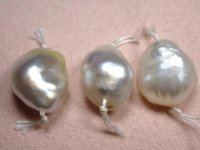
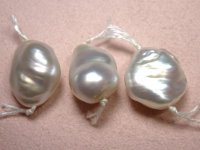
Pearl 1 (2 & 3 are in the next post.
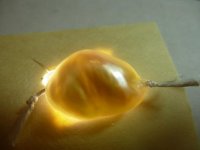

Pattye's South Sea Keshi
Here are 3 pearls of mine I've been wanting to candle, so what better thing to do on Saturday night? These were purchased from Dr. Tom Stern at Tucson a few years back. Sarah Canizzaro drilled them for me, and confirmed they were very stinky. Until that time, I had been only vaguely aware of keshi's reputation as stinkers, though I knew about "gas pearls" from Douglas' posts.
I was pretty new to pearls at the time, and Tom Stern had just started gathering and selling naturals. Caitlin and I took some photos. I'll see if I can find and link here.
Here are photos of front and back sides:
pearl 1 is approx 18.5 x 13.5 x 11mm
pearl 2 is approx 18.1 x 12.5 x 11.2mm
pearl 3 is approx 17 x 15.1 x 10.4mm


Pearl 1 (2 & 3 are in the next post.


pattye
Pearl Scholar
- Joined
- Dec 26, 2005
- Messages
- 11,541
Pearl 2
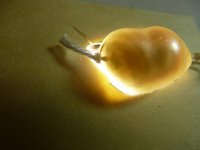

Pearl 3
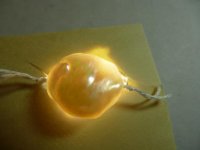
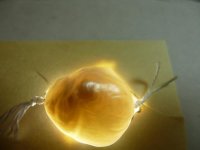
I need to find the bill of sale to see how these are described~
Here is the thread with the photo at time of purchase from Tom. My pearls are on page 4, but there are lots of other great pearl pics taken by Caitlin.


Pearl 3


I need to find the bill of sale to see how these are described~
Here is the thread with the photo at time of purchase from Tom. My pearls are on page 4, but there are lots of other great pearl pics taken by Caitlin.
Last edited:
Lagoon Island Pearls
Well-known member
- Joined
- Dec 8, 2009
- Messages
- 2,117
Nice visibility in the views and presented in good context.
Keshis are often random free forms, but these have terrific shape and luster.
The grafted tissues are clearly visible as a single entity in each view.
Well done Pattye! I hope we'll see more views of your treasures soon and often.
Keshis are often random free forms, but these have terrific shape and luster.
The grafted tissues are clearly visible as a single entity in each view.
Well done Pattye! I hope we'll see more views of your treasures soon and often.
Hi Dave and All,
I have been so busy but still managed to take some photos of the bracelet I listed on Dawn's Pearls and I think they are natural Gulf pearls.
Love to hear what Dave has to say.
Also took some photos of a pair of earrings with 9 pearls in each. I believe these are naturals too. Will add those later, probably tomorrow. All Saltwater and to me look good. But let us see what the opinions are Crossing my fingers.
Crossing my fingers.
Dawn - Bodecia
http://www.ebay.com/sch/dawncee333/m.html
eBay Seller ID dawncee333 Natural pearl collector & seller. And all round pearl lover.
Dawn?s Pearls - https://www.pearl-guide.com/forum/showthread.php?t=8351
I have been so busy but still managed to take some photos of the bracelet I listed on Dawn's Pearls and I think they are natural Gulf pearls.
Love to hear what Dave has to say.
Also took some photos of a pair of earrings with 9 pearls in each. I believe these are naturals too. Will add those later, probably tomorrow. All Saltwater and to me look good. But let us see what the opinions are
Dawn - Bodecia
http://www.ebay.com/sch/dawncee333/m.html
eBay Seller ID dawncee333 Natural pearl collector & seller. And all round pearl lover.
Dawn?s Pearls - https://www.pearl-guide.com/forum/showthread.php?t=8351
Attachments
Lagoon Island Pearls
Well-known member
- Joined
- Dec 8, 2009
- Messages
- 2,117
Am I correct in assuming these are different pearls in each image? Are they drilled through and wired?
At first glance these pass light nicely, and present with natural features, but I have a couple of concerns. These may be dispelled or confirmed by some follow up work. I have my hands full at the moment, but I've downloaded the images and will mark some details and repost them later.
But for the moment, if at all possible can you attempt to capture the wire in one of your views? It would really help to gain a perspective of the surrounding contrasts at the nucleus. Please post a regular photo of the entire piece too.
At first glance these pass light nicely, and present with natural features, but I have a couple of concerns. These may be dispelled or confirmed by some follow up work. I have my hands full at the moment, but I've downloaded the images and will mark some details and repost them later.
But for the moment, if at all possible can you attempt to capture the wire in one of your views? It would really help to gain a perspective of the surrounding contrasts at the nucleus. Please post a regular photo of the entire piece too.
pattye
Pearl Scholar
- Joined
- Dec 26, 2005
- Messages
- 11,541
Yes please, Dawn, a photo of the whole piece, with sizes of pearls, kind of metal, provenance, etc. I was confused whether the photos were all the same pearl or not. I realize you may have lots more info on your ebay listing, but I'm not always of a mind to go over there to look.
It's so much more helpful and educational for Dave, me and everyone reading this now and in the future by having complete info here.
It's so much more helpful and educational for Dave, me and everyone reading this now and in the future by having complete info here.
pattye
Pearl Scholar
- Joined
- Dec 26, 2005
- Messages
- 11,541
Thanks, Blaire! I'd been wanting to candle them for months! Finally got a little gooseneck lamp. I knew these were keshi, but thought they'd be good for comparison purposes here, besides my own curiosity, as I could make out a dark core when holding them up to a bright lamp.
Hi All,
Sorry that was dumb of me. It was bed time and I was too tired to do anything These pearls are just from the bracelet and I will add a photo of them.
These pearls are just from the bracelet and I will add a photo of them.
There are 6 pearls so a couple are doubled up. I will list them individually. I was the one that said a photo of the item should be included and I didn't do it. Just over-tired so sorry again.
In a few hours after shopping I will do it properly.
Dawn - Bodecia
http://www.ebay.com/sch/dawncee333/m.html
eBay Seller ID dawncee333 Natural pearl collector & seller. And all round pearl lover.
Dawn’s Pearls - https://www.pearl-guide.com/forum/showthread.php?t=8351
Sorry that was dumb of me. It was bed time and I was too tired to do anything
There are 6 pearls so a couple are doubled up. I will list them individually. I was the one that said a photo of the item should be included and I didn't do it. Just over-tired so sorry again.
In a few hours after shopping I will do it properly.
Dawn - Bodecia
http://www.ebay.com/sch/dawncee333/m.html
eBay Seller ID dawncee333 Natural pearl collector & seller. And all round pearl lover.
Dawn’s Pearls - https://www.pearl-guide.com/forum/showthread.php?t=8351
Hi All,
I will try again listing these candling photos. First I will upload an old photo of the bracelet. It is still very dirty in this photo and has had a salt scrub since but I just noticed there is still dirt in the drill holes so will clean that up tomorrow and post a totally clean photo of the bracelet.
The large pearls are all around 7.5 mm. The smaller pearls around 4 mm. The large pearl looks really beautiful now they are clean.
After the photo of the bracelet I will put in here photos of one (1) pearl. Then in another post go onto the next etc.
If I have forgotten anything please let me know. Oh, Dave will try and get you that photo of the wire in relation to the pearls although I think on some it shows. I tried to look down the drill holes and photograph but they are dirty still and also have gold wire mostly covering them.
Not feeling too good at the moment so forgive me if I have not made things clear.
Dawn - Bodecia
http://www.ebay.com/sch/dawncee333/m.html
eBay Seller ID dawncee333 Natural pearl collector & seller. And all round pearl lover.
Dawn?s Pearls - https://www.pearl-guide.com/forum/showthread.php?t=8351
I will try again listing these candling photos. First I will upload an old photo of the bracelet. It is still very dirty in this photo and has had a salt scrub since but I just noticed there is still dirt in the drill holes so will clean that up tomorrow and post a totally clean photo of the bracelet.
The large pearls are all around 7.5 mm. The smaller pearls around 4 mm. The large pearl looks really beautiful now they are clean.
After the photo of the bracelet I will put in here photos of one (1) pearl. Then in another post go onto the next etc.
If I have forgotten anything please let me know. Oh, Dave will try and get you that photo of the wire in relation to the pearls although I think on some it shows. I tried to look down the drill holes and photograph but they are dirty still and also have gold wire mostly covering them.
Not feeling too good at the moment so forgive me if I have not made things clear.
Dawn - Bodecia
http://www.ebay.com/sch/dawncee333/m.html
eBay Seller ID dawncee333 Natural pearl collector & seller. And all round pearl lover.
Dawn?s Pearls - https://www.pearl-guide.com/forum/showthread.php?t=8351
Attachments
Similar threads
- Replies
- 30
- Views
- 1K












